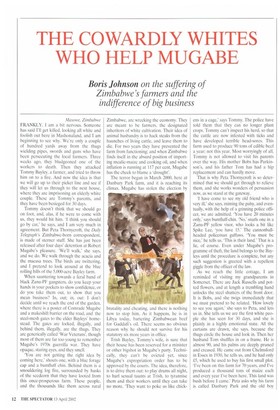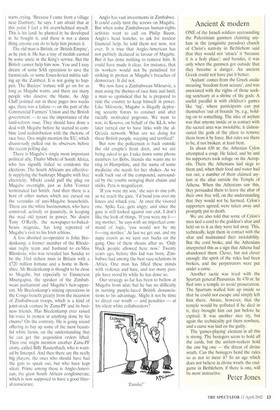THE COWARDLY WHITES WHO HELP MUGABE
Boris Johnson on the suffering of Zimbabwe's farmers and the indifference of big business
Masowe, Zimbabwe FRANKLY, I am a bit nervous. Someone has said get killed, looking all white and foolish out here in Mashonaland, and I am beginning to see why. We're only a couple of hundred yards away from the thugs wielding pipes, swords and guns who have been persecuting the local farmers. Three weeks ago, they bludgeoned one of the workers to death. Then they attacked Tommy Bayley, a farmer, and tried to throw him on to a fire. And now the idea is that we will go up to their picket line and see if they will let us through to the next house, where they are imprisoning an elderly white couple. These are Tommy's parents, and they have been besieged for 30 days.
Tommy doesn't think that we should go on foot, and, alas, if he were to come with us, they would hit him. 'I think you should go by car,' he says, and I am very much in agreement. But Peta Thornycroft, the Daily Telegraph's Zimbabwe-born correspondent, is made of sterner stuff. She has just been released after four days' detention at Robert Mugabe's pleasure. 'We'll walk,' she says, and we do. We walk through the acacia and the macasa trees. The birds are twittering, and I pretend to look around at the blue rolling hills of the 5,000-acre Bayley farm.
When sauntering towards a feral band of black Zanu-PF gangsters, do you keep your hands in your pockets to show confidence, or do you take them out, to show that you mean business? In, out; in, out: I don't decide until we reach the end of the garden, where there is a poster of Comrade Mugabe and a makeshift barrier on the road, and the steel-mesh gates to the elder Bayleys' homestead. The gates are locked, illegally, and behind them, illegally, are the thugs. They are generically called `War Veterans', though most of them are far too young to remember Mugabe's 1970s guerrilla war. They have opaque, staring eyes, and they smell.
'You are not getting the right idea by coming hcre,' shouts one, with a blue forage cap and a bumfluff chin. Behind them is a smouldering log fire, surrounded by husks of the seedcorn that they have looted from this once-prosperous farm. These people, and the thousands like them across rural Zimbabwe, are wrecking the economy. They are meant to be farmers, the designated inheritors of white cultivation. Their idea of animal husbandry is to hack steaks from the haunches of living cattle, and leave them to die. For two years they have prevented the farm from functioning; and when Zimbabwe finds itself in the absurd position of importing mealie-maize and cooking oil, and when inflation is running at 117 per cent, Mugabe has the cheek to blame a 'drought'.
The terror began in March 2000, here at Danbury Park farm, and it is reaching its climax. Mugabe has stolen the election by brutality and cheating, and there is nothing now to stop him. As it happens, he is in Libya today, bartering Zimbabwean beef for Gaddafi's oil. There seems no obvious reason why he should not survive for his statutory six more years in office.
Trish Bayley, Tommy's wife, is sure that their house has been reserved for a minister or other bigshot in Mugabe's party. Technically, they can't be evicted yet, since Mugabe's expropriation order has to be approved by the courts. The idea, therefore, is to drive them out: to play drums all night, to hurl sexual taunts at Trish, to tyrannise them and their workers until they can take no more. 'They want to poke us like chick ens in a cage,' says Tommy. The police have told them that they can no longer plant crops. Tommy can't inspect his herd, so that the cattle are now infested with ticks and have developed terrible head-sores. This farm used to produce 90 tons of edible beef a year; not this year. Most worryingly of all, Tommy is not allowed to visit his parents over the way. His mother Bobs has Parkinson's, and his father Tom has had a hip replacement and can hardly move.
That is why Peta Thomycroft is so determined that we should get through to relieve them, and she works wonders of persuasion now, as we stand at the gateway.
'I have come to see my old friend who is very ill,' she says, miming the palsy, and eventually, with the help of a grinning police officer, we are admitted. 'You have 20 minutes only,' says bumfluff-chin, 'No,' snarls one in a Zanu-PF yellow visor, who looks a bit like Spike Lee, 'you have 15.' The cannonballheaded policeman guffaws. 'You must be nice,' he tells us. 'This is their land,' That is a lie, of course. Even under Mugabe's programme of theft, the land belongs to the Bayleys until the procedure is complete, but any such suggestion is greeted with a repellent giggle from the officer of the law.
As we reach the little cottage, I am reminded of visiting my grandparents in Somerset. There are Jack Russells and potted flowers, and at length a trembling hand unlocks the steel shutters of the front door. It is Bobs, and she twigs immediately that we must pretend to be related. 'How lovely to see you again,' she says to Peta, and lets us in. She tells us we are the first white people she has seen for 30 days, and she is plainly in a highly emotional state. All the curtains are drawn, she says, because the thugs circle the house and look in. Then her husband Tom shuffles in on a frame. He is almost 90, and his palms are deeply pruned and creased. He came out from Chelmsford in Essex in 1930, he tells us, and he had only £5, which he used to buy his first small plot. 'I've been on this farm for 70 years, and I've produced a thousand tons of maize each and every year I've been here. This land was bush before I came,' Peta asks why his farm is called Danbury Park and the old boy
starts crying. 'Because I came from a village near Danbury,' he says. I am afraid that at this point I feel a hit overwhelmed myself. This is his land: he planted it; he developed it; he bought it, and there is not a damn thing anyone can do to help him protect it.
The old man is British, or 'British Empire', as he puts it. He has a tray of medals earned by some uncle in the King's service. But the British cannot help him now. You and I may dream of some SAS operation to save the farmsteads, or some Essex-levied militia sailing up the Zambezi. It is not going to happen. The Bayleys' torture will go on for as long as Mugabe wants, and there are many people who deserve the blame. As Algy Cluff pointed out in these pages two weeks ago, there was a failure — on the part of the Commercial Farmers' Union and the British government to see the importance of the land-reform issue. They should have done a deal with Mugabe before he started to combine land redistribution with the rhetoric of race hate. One might mention the EU, which disastrously pulled out its observers before the recent polling day.
There is Mugabe's single most important political ally, Thabo Mbeki of South Africa, who has signally failed to condemn the elections. The South Africans are effectively supplying the bankrupt Mugabe with free electricity. Mbeki could pull the plug on Mugabe overnight, just as John Vorster terminated Ian Smith. And then there is a host of other names which are cursed on the verandas of anti-Mugabe households. These are the white businessmen, who have connived, actively or passively, in keeping the mad old tyrant in power. No doubt Tony O'Reilly, the newspaper-to-bakedbeans magnate, has long repented of Mugabe's visit to his Irish schloss.
A less abashed co-operator is John Bredenkamp, a former member of the Rhodesian rugby team and husband to ex-Miss Rhodesia, who was revealed last Sunday to be the 33rd richest man in Britain with a £720 million fortune and a home in Berkshire. Mr Bredenkamp is thought to be close to Mugabe, but especially to Emmerson Mnangagwa, the speaker of the Zimbabwean parliament and Mugabe's heir-apparent. Mr Bredenkamp's mining operations in the Congo benefit greatly from the incursion of Zimbabwean troops, which is a kind of joint-stock venture by Zanu-PF and its business friends. Has Bredenkamp ever raised his voice in protest at anything done by his chums? On the contrary. He is going round offering to buy up some of the most beautiful white farms, on the understanding that he can get the acquisition orders lifted. Then one might mention another Zanu-PF crony, called Billy Rautenbach, who is wanted by Interpol. And then there are the really big players, the ones who should have had the guts to speak out, but who have kept silent. Prime among these is Anglo-American, the giant South African conglomerate, which is now supposed to have a good liberal conscience. Anglo has vast investments in Zimbabwe. It could easily turn the screws on Mugabe. But when some Zimbabwean human-rights activists went to call on Philip Baum, Anglo's head honcho, to ask for modest financial help, he told them not now, not ever. It is true that Anglo-American has not publicly declared in favour of Mugabe. But it has done nothing to remove him. It could have made it clear, for instance, that its workers would not be penalised for striking in protest at Mugabe's breaches of democracy. It did not.
We now have a Zimbabwean Milosevic, a man using the themes of race hate and land; a man so egotistical that he is prepared to ruin the country to keep himself in power. Like Milosevic, Mugabe is illegally deploying security forces to conduct and abet racially motivated pogroms. We went to war, in Kosovo, on behalf of the KLA, who later turned out to have links with the alQa'eda network, What are we doing for these British people, weeping and terrified?
But now the policeman is back outside the old couple's front door, and we are being asked to go. I take down some phone numbers for Bobs, friends she wants me to ring in Hampshire, and the name of some medicine she needs for her shakes. As we walk back out of the compound, surrounded by the youths swinging their chains and sticks, Peta is magnificent.
'If you were my son,' she says to one yob, as we reach the gate, 'I'd bend you over my knees and whack you.' At once the visored one, Spike Lee, gets angry; and since the gate is still locked against our exit. I don't like the look of things. 'If you were my fing mother,' he says with an imperfect command of logic, 'you would not be my f—ing mother.' At last we get out, and my nape crawls as we turn our backs on the gang. One of them shouts after us, 'Only black people allowed here now.' Twenty years ago, before this kid was born, Zimbabwe had among the best race-relations in Africa. One man has filled these minds with violence and hate, and too many people have stood by while he has done so.
Our strategy so far has been to bellow at Mugabe from afar; but he has no difficulty in turning purple-faced British denunciations to his advantage. Might it not be time to direct our wrath — and penalties — at his silent white collaborators?



















































































 Previous page
Previous page